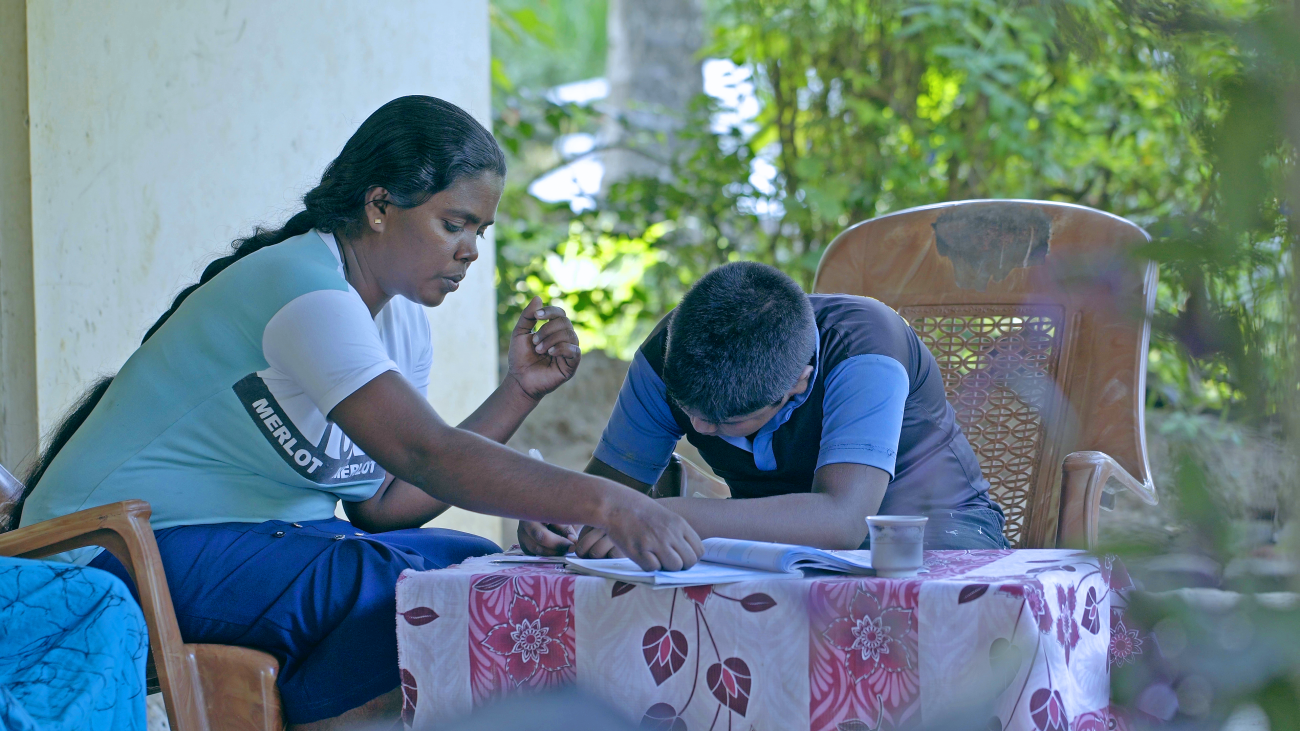Care work and housework sustains families and communities. It enables people to enter the workforce, contributes to economies as well as to individual and societal wellbeing. Globally, and in Sri Lanka, women spend more time on unpaid care work than men. Yet, their contributions are often undervalued, and the challenges they face are often overlooked.
Unpaid care work is all unpaid services provided by individuals within a household or community for the benefit of its members. This includes cooking, cleaning, looking after children, older persons, and persons with illness or disabilities.
While care work and housework can be rewarding, when one person takes on most of this work, they can experience significant stress and face a multitude of challenges, leaving little to no time for their own wellbeing.
In Sri Lanka, there is a significant disparity in how unpaid care work and housework is shared between women and men. According to Sri Lanka’s Time Use Survey (2017), 87.3% of women and girls above the age of 10 participated in housework and care work compared to only 59.7% of men and boys. More recent surveys by the Women and Media Collective also indicate that activities typically associated with unpaid care work are primarily borne by women, accounting for more than 90 percent for each activity in comparison to men. While housework and care work should not be gendered, sociocultural norms deem such work as “women’s work”. This poses several challenges for women and girls.
For instance, Sri Lanka is currently facing a socioeconomic crisis. This has forced families to choose which of their children to educate due to rising costs, poverty and increasing care needs. As adolescent girls shoulder a significantly greater care load at home, they are at a higher risk of dropping out of school or discontinuing their education.
Unequal distribution of care work at home is also a key barrier to women’s economic empowerment. Last year, A UN Women study on ‘Gender Disparities and Labour Market Challenges’ found that Sri Lankan employers were less likely to hire women, if employers faced constraints in offering flexible working hours or in financing maternity benefits. The commonly held perception of care work being “women’s work” therefore puts women at a disadvantage in the labour market.
Even when women want to engage in paid work, if there is no one to take care of children or the elderly, it is often women that leave their jobs to meet care needs at home. According to the International Labour Organization, in 2018, 606 million working aged women worldwide were unable to engage in paid work because of care responsibilities. Yet, 70 percent of women preferred to work in paid jobs. This is true to Sri Lanka as well. According to surveys conducted by Women and Media Collective, 67.5 percent of women who indicated that they like to engage in employment, were unable to do so due to care responsibilities. Inability to engage in paid employment has serious repercussions on women later on in life because they would not have access to social protection schemes such as pensions, EPF or ETF when they are older. This in turn will have a ripple effect on their quality of life and increase their risk of falling into poverty.
These are only some examples to a myriad of challenges faced by women including physical and emotional stress, limited opportunities for skill development and economic dependency which can affect women’s financial security.
This year marks the halfway point for the achievement of the Sustainable Development Goals. Changing economic and social structures to recognize and reduce the disproportionate share of unpaid care work carried out by women and girls is critical to accelerating progress towards gender equality.
By shifting social norms that portray care work as something women are “better at” or “naturally suited for”, and redistributing care responsibilities equally between women and men will ensure that women and girls have equal access to opportunities, and quality education. This will also enable families to achieve greater economic stability.
Enacting care-friendly employment policies including flexible working arrangements and paid family leave to balance work and family commitments, and investing in public care services will pave way for decent work, reduced inequalities and increased participation of women in the labour force.
Gender equality is a prerequisite for sustainable development and it’s time to take action to keep the promise of the 2030 Agenda.
As 29th October marks the first International Day of Care and Support – let’s start by sharing the care and recognizing that care work is not women’s work, but everyone’s responsibility.


